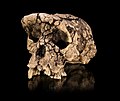Hominini
Hominini is a tribe of Hominidae, consisting of modern humans (Homo sapiens), their immediate ancestors, and other extinct relatives. This tribe is part of the family Hominidae, which also includes gorillas, chimpanzees, and orangutans. The members of the Hominini tribe are often referred to as hominins. The study of hominins is a key aspect of paleoanthropology, as it helps scientists understand the evolution of humans and their closest relatives.
Evolutionary Background[edit]
The Hominini tribe is believed to have diverged from the lineage that led to the modern chimpanzee (genus Pan) approximately 5 to 7 million years ago. This divergence marked the beginning of the hominin lineage, which is characterized by a number of evolutionary adaptations, notably bipedalism. The ability to walk upright on two legs is considered a defining characteristic of the tribe and is thought to have played a crucial role in the development of other human traits, including larger brain sizes and the use of tools.
Classification[edit]
The classification of hominins has been subject to change over time as new fossil evidence is discovered and genetic analyses are conducted. The tribe Hominini is divided into two subtribes: the Australopithecina, which includes several extinct genera such as Australopithecus and Paranthropus, and the Hominina, which includes the genus Homo and its extinct relatives such as Homo neanderthalensis (Neanderthals) and Homo erectus.
Notable Hominins[edit]
Several species within the Hominini tribe have been particularly significant in the study of human evolution:
- Australopithecus afarensis - Best known for the famous fossil "Lucy," this species is one of the earliest known hominins and lived approximately 3.9 to 2.9 million years ago.
- Homo habilis - Often considered the first member of the genus Homo, this species existed around 2.1 to 1.5 million years ago and is known for its use of stone tools.
- Homo erectus - This species was highly successful and existed from approximately 1.9 million years ago to as recently as 140,000 years ago. It is known for its relatively large brain and is thought to have been the first hominin to use fire and to leave Africa.
- Homo neanderthalensis - Neanderthals lived in Europe and parts of western Asia from about 400,000 until approximately 40,000 years ago and are closely related to modern humans, with whom they interbred.
Research and Discoveries[edit]
Research into the Hominini tribe involves a multidisciplinary approach, including paleoanthropology, archaeology, genetics, and comparative anatomy. Discoveries of fossil remains and artifacts are crucial for understanding the physical and cultural evolution of hominins. Genetic studies, particularly comparisons of DNA from modern humans, Neanderthals, and other extinct hominins, have provided insights into the relationships and migrations of these groups.
Challenges and Controversies[edit]
The study of hominin evolution is fraught with challenges and controversies. The fragmentary nature of the fossil record and the difficulty of precisely dating fossils make it challenging to construct a detailed and accurate timeline of human evolution. Additionally, the classification of hominin species and the interpretation of their relationships are often subjects of debate among scientists.
Conclusion[edit]
The Hominini tribe encompasses a diverse group of species that have played a pivotal role in the evolutionary history of humans. Research into this tribe not only sheds light on the physical and behavioral evolution of humans and their closest relatives but also provides valuable insights into the origins of human culture and technology.
Hominini[edit]
-
Hominini
-
Sahelanthropus tchadensis
-
Homo rudolfensis
Ad. Transform your life with W8MD's Budget GLP-1 injections from $75


W8MD offers a medical weight loss program to lose weight in Philadelphia. Our physician-supervised medical weight loss provides:
- Weight loss injections in NYC (generic and brand names):
- Zepbound / Mounjaro, Wegovy / Ozempic, Saxenda
- Most insurances accepted or discounted self-pay rates. We will obtain insurance prior authorizations if needed.
- Generic GLP1 weight loss injections from $75 for the starting dose.
- Also offer prescription weight loss medications including Phentermine, Qsymia, Diethylpropion, Contrave etc.
NYC weight loss doctor appointmentsNYC weight loss doctor appointments
Start your NYC weight loss journey today at our NYC medical weight loss and Philadelphia medical weight loss clinics.
- Call 718-946-5500 to lose weight in NYC or for medical weight loss in Philadelphia 215-676-2334.
- Tags:NYC medical weight loss, Philadelphia lose weight Zepbound NYC, Budget GLP1 weight loss injections, Wegovy Philadelphia, Wegovy NYC, Philadelphia medical weight loss, Brookly weight loss and Wegovy NYC
|
WikiMD's Wellness Encyclopedia |
| Let Food Be Thy Medicine Medicine Thy Food - Hippocrates |
Medical Disclaimer: WikiMD is not a substitute for professional medical advice. The information on WikiMD is provided as an information resource only, may be incorrect, outdated or misleading, and is not to be used or relied on for any diagnostic or treatment purposes. Please consult your health care provider before making any healthcare decisions or for guidance about a specific medical condition. WikiMD expressly disclaims responsibility, and shall have no liability, for any damages, loss, injury, or liability whatsoever suffered as a result of your reliance on the information contained in this site. By visiting this site you agree to the foregoing terms and conditions, which may from time to time be changed or supplemented by WikiMD. If you do not agree to the foregoing terms and conditions, you should not enter or use this site. See full disclaimer.
Credits:Most images are courtesy of Wikimedia commons, and templates, categories Wikipedia, licensed under CC BY SA or similar.
Translate this page: - East Asian
中文,
日本,
한국어,
South Asian
हिन्दी,
தமிழ்,
తెలుగు,
Urdu,
ಕನ್ನಡ,
Southeast Asian
Indonesian,
Vietnamese,
Thai,
မြန်မာဘာသာ,
বাংলা
European
español,
Deutsch,
français,
Greek,
português do Brasil,
polski,
română,
русский,
Nederlands,
norsk,
svenska,
suomi,
Italian
Middle Eastern & African
عربى,
Turkish,
Persian,
Hebrew,
Afrikaans,
isiZulu,
Kiswahili,
Other
Bulgarian,
Hungarian,
Czech,
Swedish,
മലയാളം,
मराठी,
ਪੰਜਾਬੀ,
ગુજરાતી,
Portuguese,
Ukrainian

